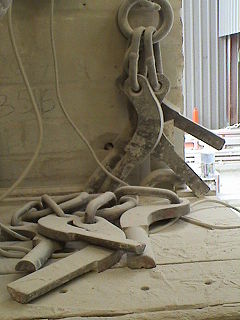| Look up shackle or shackles in Wiktionary, the free dictionary. |
A shackle is a device used as a connecting link in rigging systems.
Contents
Shackle or Shackles may also refer to:
| Look up shackle or shackles in Wiktionary, the free dictionary. |
A shackle is a device used as a connecting link in rigging systems.
Shackle or Shackles may also refer to:
| This disambiguation page lists articles associated with the title Shackle. If an internal link led you here, you may wish to change the link to point directly to the intended article. |

A shackle, also known as a gyve, is a U-shaped piece of metal secured with a clevis pin or bolt across the opening, or a hinged metal loop secured with a quick-release locking pin mechanism. The term also applies to handcuffs and other similarly conceived restraint devices that function in a similar manner. Shackles are the primary connecting link in all manner of rigging systems, from boats and ships to industrial crane rigging, as they allow different rigging subsets to be connected or disconnected quickly. A shackle is also the similarly shaped piece of metal used with a locking mechanism in padlocks. A carabiner is a type of shackle used in mountaineering.
Jack may refer to:
Poll, polled, or polling may refer to:
Mash, MASH, or M*A*S*H may refer to:
Pinch or pinching may refer to:
Reid is a surname of Scottish origin. It means "red."
Clip or CLIP may refer to:
Thomas or Tom White may refer to:

A lewis is one of a category of lifting devices used by stonemasons to lift large stones into place with a crane, chain block, or winch. It is inserted into a specially prepared hole, or seating, in the top of a stone, preferably above its centre of mass. It works by applying principles of the lever and utilises the weight of the stone to act on the long lever-arms which in turn results in a very high reaction force and friction where the short lever-arms make contact with the stone inside the hole and thereby prevents slipping.
Thomas Wood may refer to:

Jack is a given name. Since the late 20th century, Jack has become one of the most common names for boys in many English-speaking countries. While Jack is now a proper name in its own right, in English, it was traditionally used as a diminutive form of John. It can also be used as a diminutive for: Jacob, Jason, Jonathan, Jan, Johann, Johannes, Joachim and sometimes for James, from its French form Jacques, from the Latin Jacobus. It is also used as a female given name and as a surname to a lesser extent.
Ian or Iain is a name of Scottish Gaelic origin, derived from the Hebrew given name יוֹחָנָן and corresponding to the English name John. The spelling Ian is an Anglicization of the Scottish Gaelic forename Iain. It is a popular name in the English-speaking world and in Scotland, where it originated.
Gill may be a surname or given name, derived from a number of unrelated sources:

A chain is a serial assembly of connected pieces, called links, typically made of metal, with an overall character similar to that of a rope in that it is flexible and curved in compression but linear, rigid, and load-bearing in tension. A chain may consist of two or more links. Chains can be classified by their design, which can be dictated by their use:
Thomas is a common surname of English, Welsh, Irish, Scottish, French, German, Dutch, and Danish origin.
Baker is a famous surname of Old English (Anglo-Saxon) origin. From England the surname has spread to neighbouring countries such as Wales, Scotland and Ireland, and also to the English speaking areas of the Americas and Oceania where it is also common. An occupational name, which originated before the 8th century CE, from the name of the trade, baker. From the Middle English bakere and Old English bæcere, a derivation of bacan, meaning "to dry by heat." The bearer of this name may not only have been a baker of bread. The name was also used for others involved with baking in some way, including the owner of a communal oven in humbler communities, "baker". The female form of the name is "Baxter". which is seen more in Scotland. The old German form of the name is "Bäcker".
Oliver may refer to:
Simpson is an English/Scottish patronymic surname from the medieval masculine given name 'Simme'. The earliest public record of the name was in 1353 in Staffordshire, West Midlands region of England.
Clarke is a surname which means "clerk". The surname is of English and Irish origin and comes from Latin clericus. Variants include Clerk and Clark. Clarke is also uncommonly chosen as a given name.